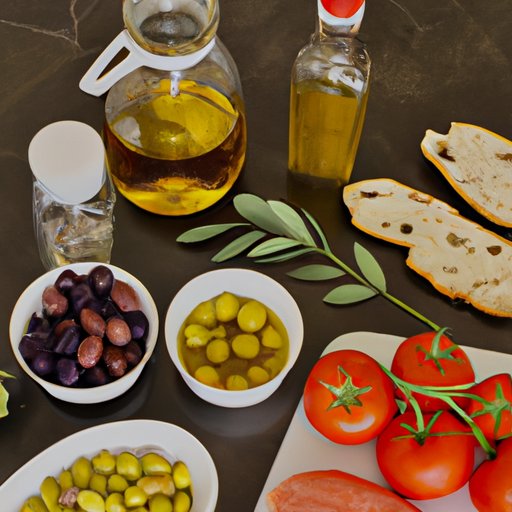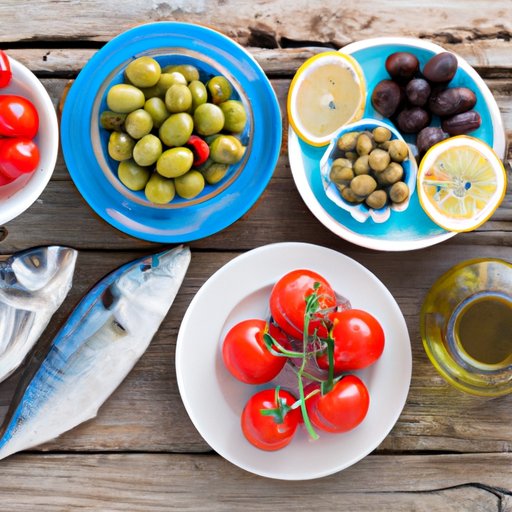Introduction
The Mediterranean diet has been around for centuries, and it is widely considered to be one of the healthiest diets in the world. It is based on the traditional foods that people in countries like Greece, Italy, and Spain have been eating for generations. This diet consists of plenty of fruits and vegetables, whole grains, lean proteins, and healthy fats like olive oil. It also includes moderate amounts of fish, dairy, and red wine.
It is important to understand the health benefits of the Mediterranean diet in order to make informed decisions about our own personal eating habits. This article will explore the nutritional value of Mediterranean foods, look at any potential health risks associated with this diet, discuss how to incorporate Mediterranean cuisine into a healthy eating plan, compare it to other popular diets, and talk about the role of exercise in combination with a Mediterranean diet.
Exploring the Nutritional Value of Mediterranean Foods
The Mediterranean diet is rich in many essential nutrients. It provides an abundance of macronutrients such as carbohydrates, proteins, and fats, as well as vitamins and minerals. Additionally, it contains various phytonutrients found in plants, which offer protection against disease. Let’s take a closer look at each of these components.
Macronutrients
The Mediterranean diet is high in carbohydrates, which are the body’s primary source of energy. It includes whole grains such as wheat, barley, and oats, as well as legumes like beans and lentils. These foods are rich in fiber, which helps to promote digestive health. The diet also includes healthy sources of protein such as fish, poultry, eggs, and nuts. Lastly, it contains healthy fats from olive oil, avocados, and nuts.
Vitamins and Minerals
The Mediterranean diet is also rich in vitamins and minerals. It provides ample amounts of vitamin A, C, and E, as well as B-complex vitamins. Additionally, it is rich in minerals such as calcium, magnesium, potassium, and iron. These nutrients are essential for the body to function properly.
Phytonutrients
The Mediterranean diet is also rich in phytonutrients, which are compounds found in plants that have protective properties. Fruits and vegetables are especially high in phytonutrients, and they are an integral part of the Mediterranean diet. Eating a variety of colorful fruits and vegetables can help to provide your body with the antioxidants it needs to stay healthy.

A Look at the Health Risks Associated with Mediterranean Diets
The Mediterranean diet is generally considered to be very healthy, but there are some potential risks associated with it. One of the main concerns is that it is high in fat, particularly saturated fat. Too much saturated fat can increase the risk of heart disease. Additionally, some Mediterranean dishes can be high in salt, which can raise blood pressure. It is important to be mindful of these potential risks when following the Mediterranean diet.

How to Incorporate Mediterranean Cuisine into a Healthy Eating Plan
Incorporating Mediterranean cuisine into a healthy eating plan is relatively easy. The key is to focus on balance. It is important to maintain a balance of macronutrients such as carbohydrates, proteins, and fats. Additionally, it is important to choose whole grains such as wheat, barley, and oats instead of refined grains like white bread and white rice. Healthy fats from olive oil, avocados, and nuts should also be included in moderation. Finally, it is important to add plenty of fresh vegetables and fruits to your meals.

Comparing Mediterranean Diet to Other Popular Diets
The Mediterranean diet is often compared to other popular diets such as the Paleo diet, Keto diet, and Vegan diet. While all of these diets have their own unique benefits, they all share some similarities with the Mediterranean diet. For example, they all emphasize the importance of eating fresh fruits and vegetables, lean proteins, and healthy fats. Additionally, they all discourage the consumption of processed foods. However, the Mediterranean diet is unique in its emphasis on whole grains, legumes, and moderate amounts of fish, dairy, and red wine.
The Role of Exercise in Combination with a Mediterranean Diet
Exercise is an important part of any healthy lifestyle, and it is especially important when combined with a Mediterranean diet. Regular physical activity can help to reduce the risk of chronic diseases, improve mental health, and promote weight loss. When combined with a Mediterranean diet, exercise can help to maximize the health benefits of this way of eating. Some types of exercise that are particularly beneficial for those following a Mediterranean diet include walking, cycling, swimming, and strength training.
Conclusion
In summary, the Mediterranean diet is a healthy and balanced way of eating that is rich in essential nutrients. It provides an abundance of macronutrients, vitamins and minerals, and phytonutrients. However, it is important to be aware of any potential health risks associated with this diet, such as high fat and salt content. The key to incorporating Mediterranean cuisine into a healthy eating plan is to focus on balance and moderation. Additionally, adding regular exercise to this way of eating can help to maximize its health benefits.
Overall, the Mediterranean diet is a nutritious and delicious way of eating that can be incorporated into a healthy lifestyle. With the right approach and a commitment to balance, this diet can be an excellent choice for anyone looking to improve their overall health and wellbeing.
(Note: Is this article not meeting your expectations? Do you have knowledge or insights to share? Unlock new opportunities and expand your reach by joining our authors team. Click Registration to join us and share your expertise with our readers.)
